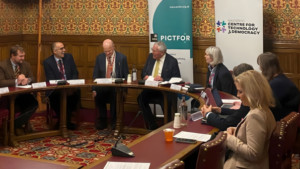Records Management In The Age Of Digital Disruption | Survey Results
The way we work is changing
The technologies that are available to us everyday means that we are communicating and collaborating more than ever before. We are using different mediums in which to get our work done, from using smart phones and tablets to social sites and chat groups.
This is great news for productivity, but how we organise this mass of content can be an enormous task to deal with. The content that is created by any organisation is inherently very valuable, but ensuring that this value is protected, not only for future use, but also in fulfilling all the compliance regulations any company faces, can become an issue.
To see how records and information managers are dealing with this change to the workplace, we thought what better way to understand than to ask them, and where better than the IRMS (Information and records management society) conference 2015, Europe’s premier information management event, a gathering of 400 information professionals from all across the world.
As a sponsor of the event, Zaizi and the team made their way to the Celtic Manor in South Wales, to head up the booth and get round with our questionnaire (thanks to everyone that came to see us and filled out the questionnaire!). Also attending was Zaizi’s central government clients, the Department for Business, Innovation and Skills (BIS). The speaker was Julia Harwood, Chief Information officer at BIS, with her session titled, ‘Alfresco in a Government Department – Flash to Bang!’
The Survey
The survey followed along three main avenues of questioning;
- Collaboration across the organization
- User adoption and training
- Enterprise Search and document handling
Key findings:
50% say records management is a priority area for review in the next 6 months
Half of all the companies we approached said that records management was to be imminently reviewed. With so many changes in the workplace and new tools available, it is understandable that this would be an area organisations were seeking to improve.
43% say automated records declaration is a critical upgrade
One way in which they are looking at improving is with automated records filing. Modern ECM systems, like Alfresco, will be able to use things like automatic metadata generation and machine learning to identify records as soon as the user uploads it to the system.
If you want to find out more about automated records see our page on Machine Learning
36% of organisations feel the outer workforce have no training in records available and inconsistent workflows
Only 14% say senior management evangelises the benefits of enterprise wide records management
User adoption is usually best when lead from the top. CEO’s that actively promote ideas like document management and digital records keeping, will find that the users will be more inclined to follow suit. But what also is needed are ideas like familiar and easy user interfaces (UI) that don’t alienate new staff and can be picked up easily, as well as better workflow management. Thankfully both these features are available in Alfresco One.
Carlos Miguens – Head of delivery at Zaizi has worked extensively with organisations to ensure new software and ways of working are adopted within an organisation, have a look at his presentation from the Alfresco Summit; Beyond Technology, the challenge of active user engagement.
36% of organisations still have 50-75% of paper records
100% are still using paper for record keeping
29% of organisations say paper records are increasing
Paper has been falling out of fashion for many years. Getting paper from your workforce, to department heads, to the records management department can be a difficult and time-consuming task. Ensuring then that these are filed correctly, kept in good condition and accessible for FOI and audits is a huge task. Many councils, like our clients Bristol CC have huge repositories of paper records, over several buildings and kept on a tight budget. The emphasis from these local councils is that these need to be reduced.
The results show that organisations are still dealing with huge amounts of paper, and no organisation has managed to remove it entirely from their workforce. With the advent of ideas like digital first records, modern and secure ECMs and digital signatures, there is no reason why the end of paper is not in sight.
If you would like to see how Bristol County Council have managed to slim down their paper records, view our case study.
Latest content
-

Zaizi founder Aingaran Pillai named chair of techUK’s Security and Public Safety SME Forum
Published on: 2 December, 2025 -

Zaizi ‘Highly Commended’ for Best Employer at 2025 Computing Women in Tech Excellence Awards
Published on: 28 November, 2025 -

Modernising government for AI: What key challenges do departments face?
Published on: 6 November, 2025 -

PICTFOR roundtable: Is regulation a handbrake or a catalyst to public trust and innovation in AI?
Published on: 30 October, 2025
